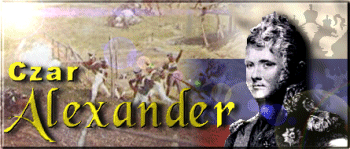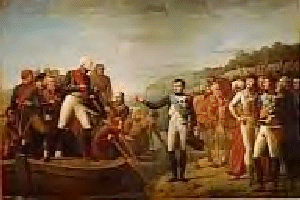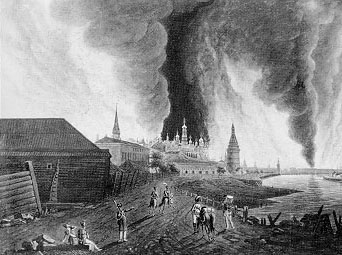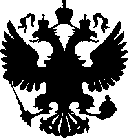Czar Alexander I of Russia
(1777-1825)
 Alexander succeeded his father the insane Paul I on March 24 1801. As Czar of Russia, Alexander did a lot of good to improve the administration of his massive empire. In 1802 a more orderly administration was drafted with the founding of eight ministries of government. Also, the situation for the serfs was improved as Russia was the only country in Europe to still condone serfhood, an inheritence from the Middle Ages. Alexander had been educated by a liberal and modern teacher from Switzerland by the name of Laharpe. Militarily, Alexander also had the best starting-position; the great general Suvorov had blown new life into the Russian army.
Alexander succeeded his father the insane Paul I on March 24 1801. As Czar of Russia, Alexander did a lot of good to improve the administration of his massive empire. In 1802 a more orderly administration was drafted with the founding of eight ministries of government. Also, the situation for the serfs was improved as Russia was the only country in Europe to still condone serfhood, an inheritence from the Middle Ages. Alexander had been educated by a liberal and modern teacher from Switzerland by the name of Laharpe. Militarily, Alexander also had the best starting-position; the great general Suvorov had blown new life into the Russian army.
Alexander's initial admiration for emperor Napoleon of France soon faded after the Enghien-affair and he thereby pulled Russia into the third coalition against France in 1805. Great Britain, Austria and Russia were the primary memebers of the coalition. With the Austrian armies under the command of Mack surrounded and defeated at Ulm, Czar Alexander led his Russian armies onto Austrian soil and joined up with the Austrian emperor Francis. In the meantime Napoleon had taken Vienna on November 13, 1805. The Allies now prepared for battle and the "Battle of the three Emperors" was fought on December 2 at Austerlitz. The Allies; Austria and Russia, were beaten in what has been called Napoleon's greatest victory. And the French eagle had taken off.
The young Alexander had just faced and confronted the greatest military strategist in history, but did not give up yet. In 1806, Napoleon went on to defeat the Prussians. His eagles were this time flying in Berlin. A bloody war followed in Poland in 1807 between the French and Alexander's Russians. It was here many of the Russian soldiers who were later to participate in the war against Sweden, received their practical training. After the defeat at Friedland, the Czar had had enough. "If the war is not ended, our officers will start shooting themselves, as the result is obviously the same", one of the Czar's advisors told him. The battles in the Polish campaign, notably Eylau and Friedland, had been massive massacres for both sides.
The treaty of Tilsit followed. Napoleon and Alexander met, on June 25 1807, on a raft in the Niemen river, the natural border between Mother Russia and Central Europe. The two emperors seemed to like each other; reviewed military parades together and together issuing rewards to soldiers in the ranks. Alexander agreed to join Napoleon's Continental Blockade against Great Britain, and in a secret addition to the treaty, Europe were divided into an eastern and a western part, the eastern Russian part including Sweden. Europe was thereby and in this way, divided between the two great empires.
 Russia was from then on an ally of France and to force Sweden into the Continental Blockade, Russian troops so crossed the border to Finland in early 1808. Finland was conquered in the war of 1808-09. By March 1809, when the fighting forces had moved over to Sweden, Alexander arrived in Finland and attended the meeting at Borgå (Borgå Lantdag) where the Finnish estates had gathered. Finland became a part of Russia as a Grand Duchy, with Alexander himself as Grand Duke, at the peace treaty of Fredrikshamn September 17, 1809. The Finnish polulation thereby had to swear allegiance to the Russian Czar. On the Finnish side, this was done, if not willingly, so at least without protests. The Russian troops had behaved as well as could be expected during the war on Sweden, keeping atrocities at a minimum in occupied areas. At the higher levels of Finnish society, the Russian conquerors had even been welcomed.
Russia was from then on an ally of France and to force Sweden into the Continental Blockade, Russian troops so crossed the border to Finland in early 1808. Finland was conquered in the war of 1808-09. By March 1809, when the fighting forces had moved over to Sweden, Alexander arrived in Finland and attended the meeting at Borgå (Borgå Lantdag) where the Finnish estates had gathered. Finland became a part of Russia as a Grand Duchy, with Alexander himself as Grand Duke, at the peace treaty of Fredrikshamn September 17, 1809. The Finnish polulation thereby had to swear allegiance to the Russian Czar. On the Finnish side, this was done, if not willingly, so at least without protests. The Russian troops had behaved as well as could be expected during the war on Sweden, keeping atrocities at a minimum in occupied areas. At the higher levels of Finnish society, the Russian conquerors had even been welcomed.
Russia was committed in other wars as well during the Napoleonic era. Against Persia in the Middle East in 1804-13, Russia gained some territory. The war against Turkey 1806-12 was of greater importance though. Bessarabia was annexed by the Russians and Alexander signed a hasty peace treaty in 1812 as the great war against Napoleon was coming up.
Russia was having a hard time accepting the Continental Blockade and soon started trading with the British again, the cracks in the unstable alliance between France and Russia increased and the whole thing soon fell apart. By 1812 all hope for an understanding was lost. The real challenge of Alexander's reign began on June 24 as Napoleon's La Grande Armée crossed the border to Russia. The Russians immediately proclaimed the Great Patriotic War, but retreated further on into the massive country. At Borodino the Greatest engagement of this war, as well as one of the bloodiest of the nineteenth century was fought, on September 7, on the road to Moscow. The Russian commander Kutuzov fought for his positions all day but later pulled back, ending the battle in a formidable draw that cost the Russians 44.000 dead and the French-allied side 33.000. Napoleon's troops entered Moscow on September 14, while the city was flamed by the fleeing Russians themselves. "What a curious decision! What People! They are Scythians!" Napoleon said when he saw the burning city. This was the war of the scorched-earth tactics.
 But Alexander was not prepared to capitulate although the second city of his empire had fallen. No, the fight went on and Napoleon was after a while compelled to retreat back westwards. Now the scorched-earth tactics practiced by the Russian armies came into even greater use, as all land the French retreated through was destroyed and could not maintain an army on the march. The army that left Moscow was still very much a formidable force to be reckoned with, but the retreat, through the freezing Russian winter, constantly harassed by the fierce cossacks, forced it to its knees. What followed was the total destruction of Napoleon's armies, one of the greatest disasters in military history. The greater they come, the harder they fall.
But Alexander was not prepared to capitulate although the second city of his empire had fallen. No, the fight went on and Napoleon was after a while compelled to retreat back westwards. Now the scorched-earth tactics practiced by the Russian armies came into even greater use, as all land the French retreated through was destroyed and could not maintain an army on the march. The army that left Moscow was still very much a formidable force to be reckoned with, but the retreat, through the freezing Russian winter, constantly harassed by the fierce cossacks, forced it to its knees. What followed was the total destruction of Napoleon's armies, one of the greatest disasters in military history. The greater they come, the harder they fall.
The French emperor was quickly on his feet though. The wars of liberation of 1813 therefore followed the French defeat in Russia; Napoleon fought like a wolf in Germany but the Coalition, which now also included the former French allies of Austria and Prussia, overwhelmed him in numbers and defeated him at the desperate battle of Leipzig. Russian troops were committed throughout the entire campaign and marched with the allies as they entered French soil in 1814. The battle now stood outside Paris, with the French emperor committing his last reserves in the final battles. Without doubt one of the greatest days of Czar Alexander's life was when he at the head of the Coalition armies marched into Paris on March 31, 1814. He also visited the former empress Josephine at Malmaison. Josephine died that same year and Napoleon himself was exiled to Elba.
After the defeat of the First Empire, Alexander protected France from Prussian vindictive demands and also became a driving force behind the signing of the Holy Alliance of 1815 between the Great Powers of Europe. This alliance was designed to counter any new revolutions that might arise and to protect "high Christian ideals" in Europe. The final years of his reign were despotic and Alexander drew back, not taking too great a part in the ruling of the massive empire now under his reign. His reign, beginning with modernization and good reforms now took on the ugly face of conservatism. He died in 1825, being succeeded to the throne by his brother Nicholas I.

Back to Biographies
© Göran Frilund 2000-03, All Rights Reserved.
If you've surfed onto this page from outside and there is no menu on the left,
CLICK HERE for the full Website.

 Alexander succeeded his father the insane Paul I on March 24 1801. As Czar of Russia, Alexander did a lot of good to improve the administration of his massive empire. In 1802 a more orderly administration was drafted with the founding of eight ministries of government. Also, the situation for the serfs was improved as Russia was the only country in Europe to still condone serfhood, an inheritence from the Middle Ages. Alexander had been educated by a liberal and modern teacher from Switzerland by the name of Laharpe. Militarily, Alexander also had the best starting-position; the great general Suvorov had blown new life into the Russian army.
Alexander succeeded his father the insane Paul I on March 24 1801. As Czar of Russia, Alexander did a lot of good to improve the administration of his massive empire. In 1802 a more orderly administration was drafted with the founding of eight ministries of government. Also, the situation for the serfs was improved as Russia was the only country in Europe to still condone serfhood, an inheritence from the Middle Ages. Alexander had been educated by a liberal and modern teacher from Switzerland by the name of Laharpe. Militarily, Alexander also had the best starting-position; the great general Suvorov had blown new life into the Russian army. Russia was from then on an ally of France and to force Sweden into the Continental Blockade, Russian troops so crossed the border to Finland in early 1808. Finland was conquered in the war of 1808-09. By March 1809, when the fighting forces had moved over to Sweden, Alexander arrived in Finland and attended the meeting at Borgå (Borgå Lantdag) where the Finnish estates had gathered. Finland became a part of Russia as a Grand Duchy, with Alexander himself as Grand Duke, at the peace treaty of Fredrikshamn September 17, 1809. The Finnish polulation thereby had to swear allegiance to the Russian Czar. On the Finnish side, this was done, if not willingly, so at least without protests. The Russian troops had behaved as well as could be expected during the war on Sweden, keeping atrocities at a minimum in occupied areas. At the higher levels of Finnish society, the Russian conquerors had even been welcomed.
Russia was from then on an ally of France and to force Sweden into the Continental Blockade, Russian troops so crossed the border to Finland in early 1808. Finland was conquered in the war of 1808-09. By March 1809, when the fighting forces had moved over to Sweden, Alexander arrived in Finland and attended the meeting at Borgå (Borgå Lantdag) where the Finnish estates had gathered. Finland became a part of Russia as a Grand Duchy, with Alexander himself as Grand Duke, at the peace treaty of Fredrikshamn September 17, 1809. The Finnish polulation thereby had to swear allegiance to the Russian Czar. On the Finnish side, this was done, if not willingly, so at least without protests. The Russian troops had behaved as well as could be expected during the war on Sweden, keeping atrocities at a minimum in occupied areas. At the higher levels of Finnish society, the Russian conquerors had even been welcomed. But Alexander was not prepared to capitulate although the second city of his empire had fallen. No, the fight went on and Napoleon was after a while compelled to retreat back westwards. Now the scorched-earth tactics practiced by the Russian armies came into even greater use, as all land the French retreated through was destroyed and could not maintain an army on the march. The army that left Moscow was still very much a formidable force to be reckoned with, but the retreat, through the freezing Russian winter, constantly harassed by the fierce cossacks, forced it to its knees. What followed was the total destruction of Napoleon's armies, one of the greatest disasters in military history. The greater they come, the harder they fall.
But Alexander was not prepared to capitulate although the second city of his empire had fallen. No, the fight went on and Napoleon was after a while compelled to retreat back westwards. Now the scorched-earth tactics practiced by the Russian armies came into even greater use, as all land the French retreated through was destroyed and could not maintain an army on the march. The army that left Moscow was still very much a formidable force to be reckoned with, but the retreat, through the freezing Russian winter, constantly harassed by the fierce cossacks, forced it to its knees. What followed was the total destruction of Napoleon's armies, one of the greatest disasters in military history. The greater they come, the harder they fall.